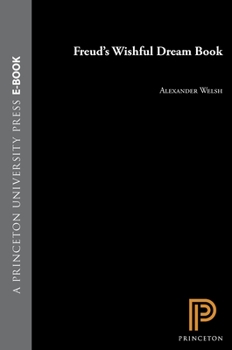Freud's Wishful Dream Book
Although it is customary to credit Freud's self-analysis, it may be more accurate, Alexander Welsh argues, to say that psychoanalysis began when The Interpretation of Dreams was published in the last weeks of the nineteenth century. Only by going public with his theory--that dreams manifest hidden wishes--did Freud establish a position to defend and embark upon a career. That position and career have been among the most influential in this century. In August 1899, Freud wrote to Wilhelm Fliess of the dream book in terms reminiscent of Dante's Inferno . Beginning from a dark wood, this modern journey features "a concealed pass though which I lead the reader--my specimen dream with its peculiarities, details, indiscretions, bad jokes--and then suddenly the high ground and the view and the question, Which way do you wish to go now?" Physician that he is, Freud appoints himself guide rather than hero, yet the way "you" wish to go is very much his prescribed way. In Welsh's book, readers are invited on Freud's journey, to pause at each concealed pass in his seminal work and ask where the guide is taking them and why. Along the way, Welsh shows how Freud's arbitrary turnings are themselves wishful, intended to persuade by pleasing the reader and author alike; that his interest in secrets and his self-proclaimed modest ambition are products of their time; and that the book may best be read as a romance or serial comedy. "Some of the humor throughout," Welsh notes, "can only be understood as a particular kind of fine performance." Welsh offers the first critical overview of the argument in Freud's masterpiece and of the author who presents himself as guide.
Format:Hardcover
Language:English
ISBN:0691037183
ISBN13:9780691037189
Release Date:September 1994
Publisher:Princeton University Press
Length:168 Pages
Weight:1.05 lbs.
Dimensions:0.7" x 7.8" x 10.0"
Customer Reviews
1 rating
A study of Freud-as-novelist
Published by Thriftbooks.com User , 24 years ago
This book goes a long way toward locating Freud in the tradition of the nineteenth-century novel. Welsh (unlike many who tackle Freud these days) is imaginatively equipped to engage with "The Interpretation of Dreams," and approaches the book as one would a literary text, perhaps the only way in which it is possible to read Freud anymore. In doing so he manages to avoid the twin pitfalls of adulation and "Freud-bashing"; "useful" is the way I'd characterize it.






